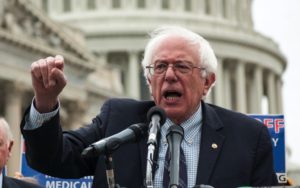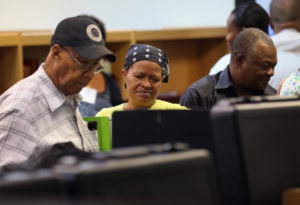
That focus on equality has allowed Sen. Bernie Sanders to garner quite a bit of support from the Black community.
Sanders has long been recognized as a “crusader for economic justice” and he was one of the figures present with Dr. Martin Luther King Jr. during the historic march on Washington back in 1963.
He has, in more ways than one, made his stance on racial equality clear. But a closer look at what exactly that stance is suggests that Sanders still may not be the ideal candidate when it comes to addressing issues of the Black community.
In a compelling article, Vox’s Dara Lind suggests that while Sanders has a passion for economic justice, he has remained “less attentive to the rising movement for racial justice, which holds that racial disadvantage won’t be eradicated only by efforts at economic equality.”
Much like the Kanye Wests and Raven Symones of the world, Sanders’ political platform is one that tends to turn a blind eye to issues of race that are buried in the reality that, in America, the very color of one’s skin can leave them significantly disadvantaged and discriminated against.
Instead, Sanders platform operates on the belief that issues of racial equality are completely spawned from economic issues — ignoring social and political woes that have specifically targeted the Black community for centuries regardless of their own economic status or progression.
It’s the same type of political philosophy that Salon’s Joan Walsh said is present in Elizabeth Warren’s platform as well.
“Looking at the overwhelmingly white Bernie Sanders event last week, I saw it again: the rhetoric and stagecraft employed by white progressives whom I admire too often — inadvertently, I think — leaves out people who aren’t white,” Walsh writes.
Walsh noted that while Sanders’ home state of Virginia does have an overwhelmingly white population, his rhetoric “could have told a more inclusive story” just as Warren’s could have.
“I love her stirring stories about her upbringing: the days when her mother’s minimum wage job could support a family, when unions built the American middle class, and when Warren herself could attend a public university for almost nothing,” Walsh notes. “Like a lot of white progressives, she points to the post World War II era as a kind of golden age when income inequality flattened and opportunity spread, the result of progressive action by government.”
But just how glorious were these days of economic resurgence for Black citizens?
Despite the sharp decline in Black unemployment and the rise of incomes for Black citizens during this time, the plights of the Black community were still crushing.
“Black people were locked out of many of the wealth-generating opportunities of the era,” Walsh explained. “Blocked from suburbs with restricted covenants and redlines into neighborhoods where banks wouldn’t lend; left out by the GI Bill, which didn’t prevent racial discrimination; neglected by labor unions, which discriminated against or outright blocked black members.”

In the minds of white progressives, fixing certain aspects of the American economy was the gateway to addressing the plights of the Black community, not understanding the true depth of racism and discrimination in a country built upon the backs of enslaved Black ancestors.
And this frustrating trend hasn’t been limited to white progressives either. It’s also the same philosophy that many believe has plagued President Barack Obama’s time in office.
But even as Walsh noted, it’s no sign of evil politicians who don’t care about Black voters.
“Pointing to Warren and Sanders’ shortcomings when it comes to racial politics doesn’t mean they’re evil, or they can’t learn to see things with a different frame,” she added. “But they’re going to have to, or they’ll find that the populist energy that’s eclipsing Democratic Party centrists will be dissipated by racial tension no one can afford.”
It’s why the 2016 presidential election may mark the beginning of a shift in Black voter behavior as Black citizens grow weary of blindly relying on Democratic candidates to finally address the struggles and challenges that have plagued their communities for decades.


